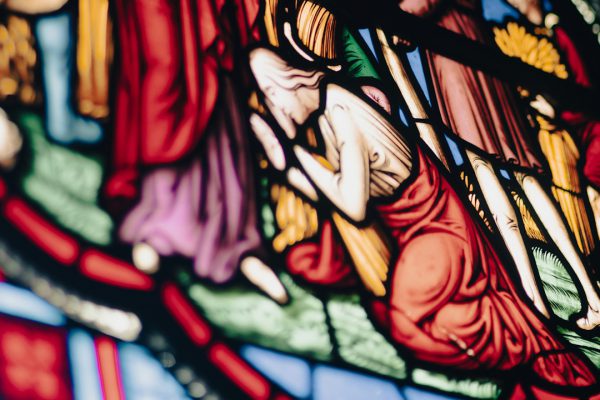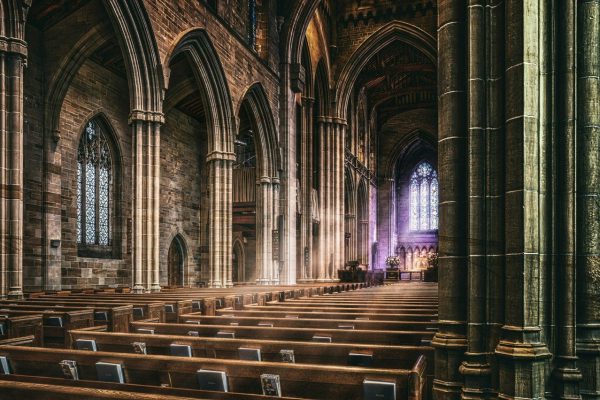When we struggle with sin and are tempted to despair and forget God’s love for us our first instinct isn’t usually to turn to the Old Testament, especially the prophets. Unfortunately, many of us have unwittingly come to associate the prophetic books as only filled with doom, despair, and judgment, not to mention challenging to read. Yet one of the most stunning and breathtaking places to understand how much God loves, delights in, and is committed to his people can be found in the book of Isaiah.
In the last chapters of the book (60-66) we get an in-depth and concentrated vision of the coming salvation for the city of God, Zion (another name for Jerusalem), and all the redeemed of the Lord who dwell there. In other words, we get a snapshot of the new heavens and earth that the NT describes as the hope of the church of the risen Lord Jesus (Rev. 21-22). Take for example this passage from Isaiah 62:1-5:
1For Zion’s sake I will not keep silent,
and for Jerusalem’s sake I will not be quiet,
until her righteousness goes forth as brightness,
and her salvation as a burning torch.
2 The nations shall see your righteousness,
and all the kings your glory,
and you shall be called by a new name
that the mouth of the Lord will give.
3You shall be a crown of beauty in the hand of the Lord,
and a royal diadem in the hand of your God.
4You shall no more be termed Forsaken,
and your land shall no more be termed Desolate,
but you shall be called My Delight Is in Her,
and your land Married;
for the Lord delights in you,
and your land shall be married.
5For as a young man marries a young woman,
so shall your sons marry you,
and as the bridegroom rejoices over the bride,
so shall your God rejoice over you.
Consider the promises that await Zion (aka., God’s people, the church). In verse 2, Isaiah declares that Zion will be righteous, glorified, and called by a new name (cf. Rev 2:17; 3:12). Because of the city’s righteousness and glory, they will be a crown of beauty, which is contrast the to the fallen “city” of humanity that has rejected and rebelled against God (cf. Isa. 24-27). In verse 4, Isaiah prophecies that, despite the sin and idolatry and stubbornness of God’s own people that caused God to abandon them for a time, they would no longer be forsaken or their land desolate. God would not ultimately leave or forsake his people but promises to be with them for ever (Heb. 13:5). By the end of verse 5, there is an overwhelming sense of joy, peace, safety, beauty, and righteousness that await these people and this city because their covenant keeping God is committed to them.
But what is most striking about this passage is that God is said to delight in and rejoice over his people like a bridgegroom rejoicing over and delighting in his bride. The ESV Study Bible‘s note on this passage describes this reality well:
Isaiah explains that in God’s great plan of salvation, he not only forgives his people, protects them, heals them, provides for them, restores them to their home, reconciles them to each other, transforms them so they are righteous, honors them, exalts them above all nations, and makes them a blessing to all nations, as he called them to be—but more than all these things, he actually delights in his people.
This is what makes the good news of Jesus so good! Knowing our helpless captivity to sin and our radical corruption by sin, our hatred of God, our natural love of darkness, and our constant struggles even as believers, this news almost is too good to be true. But if it were not so, God wouldn’t have told us so in his word. Our God doesn’t just put up with us. He isn’t bothered by us; he doesn’t regret saving us. He actually likes us and loves us, and we greatly please him.
In his commentary on this passage, Ray Ortlund sums it up: “Here is the meaning of human history. God intends to prove, through Christ, how much he can love and bless ruined human beings. And his love is of the nature of delight.” Jesus tells us that he loves us with the same love that the Father has for him. (Jn 15:9) and that the Father loves us with the same unending, infinitely glorious love that he has for his Son (Jn. 17:23). Our blessed assurance is not only that Jesus is ours but that we are God’s.
There will be times when we will fall back into sin; we will face situations that will tempt us to despair and lose all our hope in God and his promises to restore and make all things new; there may be times that we believe the lie that God has abandoned us and given up all hope of redeeming us. But, be of good courage and let not your heart be troubled, believer, for your God, your Maker, your Father, your Redeemer, your Husband, delights in you.

Mitch Bedzyk serves as a pastor Emmanuel Community Church, overseeing music and Sunday Classes. He received his Master of Theological Studies from Midwestern Baptist Theological Seminary and works in IT for the NY Office of Mental Health. He and his wife, Sarah, have five children: Kya, Khalli, Oliver, Amelia, and Micah. In his spare time he enjoys reading, coffee, guitar, being an MLS fanatic and playing fantasy soccer.




